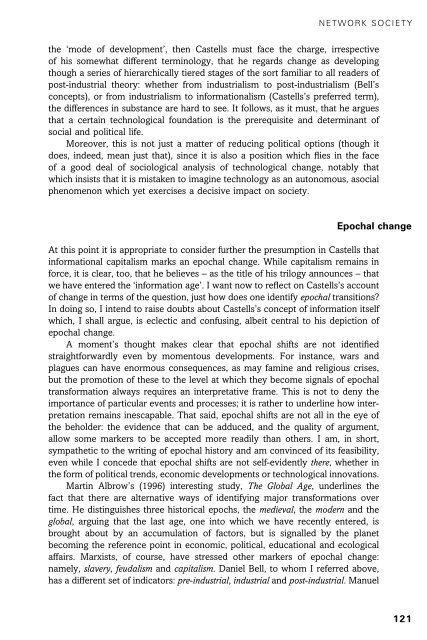Theories of the Information Society, Third Edition - Cryptome
Theories of the Information Society, Third Edition - Cryptome
Theories of the Information Society, Third Edition - Cryptome
Create successful ePaper yourself
Turn your PDF publications into a flip-book with our unique Google optimized e-Paper software.
NETWORK SOCIETY<br />
1<br />
1<br />
<strong>the</strong> ‘mode <strong>of</strong> development’, <strong>the</strong>n Castells must face <strong>the</strong> charge, irrespective<br />
<strong>of</strong> his somewhat different terminology, that he regards change as developing<br />
though a series <strong>of</strong> hierarchically tiered stages <strong>of</strong> <strong>the</strong> sort familiar to all readers <strong>of</strong><br />
post-industrial <strong>the</strong>ory: whe<strong>the</strong>r from industrialism to post-industrialism (Bell’s<br />
concepts), or from industrialism to informationalism (Castells’s preferred term),<br />
<strong>the</strong> differences in substance are hard to see. It follows, as it must, that he argues<br />
that a certain technological foundation is <strong>the</strong> prerequisite and determinant <strong>of</strong><br />
social and political life.<br />
Moreover, this is not just a matter <strong>of</strong> reducing political options (though it<br />
does, indeed, mean just that), since it is also a position which flies in <strong>the</strong> face<br />
<strong>of</strong> a good deal <strong>of</strong> sociological analysis <strong>of</strong> technological change, notably that<br />
which insists that it is mistaken to imagine technology as an autonomous, asocial<br />
phenomenon which yet exercises a decisive impact on society.<br />
Epochal change<br />
1<br />
2<br />
1<br />
1<br />
At this point it is appropriate to consider fur<strong>the</strong>r <strong>the</strong> presumption in Castells that<br />
informational capitalism marks an epochal change. While capitalism remains in<br />
force, it is clear, too, that he believes – as <strong>the</strong> title <strong>of</strong> his trilogy announces – that<br />
we have entered <strong>the</strong> ‘information age’. I want now to reflect on Castells’s account<br />
<strong>of</strong> change in terms <strong>of</strong> <strong>the</strong> question, just how does one identify epochal transitions?<br />
In doing so, I intend to raise doubts about Castells’s concept <strong>of</strong> information itself<br />
which, I shall argue, is eclectic and confusing, albeit central to his depiction <strong>of</strong><br />
epochal change.<br />
A moment’s thought makes clear that epochal shifts are not identified<br />
straightforwardly even by momentous developments. For instance, wars and<br />
plagues can have enormous consequences, as may famine and religious crises,<br />
but <strong>the</strong> promotion <strong>of</strong> <strong>the</strong>se to <strong>the</strong> level at which <strong>the</strong>y become signals <strong>of</strong> epochal<br />
transformation always requires an interpretative frame. This is not to deny <strong>the</strong><br />
importance <strong>of</strong> particular events and processes; it is ra<strong>the</strong>r to underline how interpretation<br />
remains inescapable. That said, epochal shifts are not all in <strong>the</strong> eye <strong>of</strong><br />
<strong>the</strong> beholder: <strong>the</strong> evidence that can be adduced, and <strong>the</strong> quality <strong>of</strong> argument,<br />
allow some markers to be accepted more readily than o<strong>the</strong>rs. I am, in short,<br />
sympa<strong>the</strong>tic to <strong>the</strong> writing <strong>of</strong> epochal history and am convinced <strong>of</strong> its feasibility,<br />
even while I concede that epochal shifts are not self-evidently <strong>the</strong>re, whe<strong>the</strong>r in<br />
<strong>the</strong> form <strong>of</strong> political trends, economic developments or technological innovations.<br />
Martin Albrow’s (1996) interesting study, The Global Age, underlines <strong>the</strong><br />
fact that <strong>the</strong>re are alternative ways <strong>of</strong> identifying major transformations over<br />
time. He distinguishes three historical epochs, <strong>the</strong> medieval, <strong>the</strong> modern and <strong>the</strong><br />
global, arguing that <strong>the</strong> last age, one into which we have recently entered, is<br />
brought about by an accumulation <strong>of</strong> factors, but is signalled by <strong>the</strong> planet<br />
becoming <strong>the</strong> reference point in economic, political, educational and ecological<br />
affairs. Marxists, <strong>of</strong> course, have stressed o<strong>the</strong>r markers <strong>of</strong> epochal change:<br />
namely, slavery, feudalism and capitalism. Daniel Bell, to whom I referred above,<br />
has a different set <strong>of</strong> indicators: pre-industrial, industrial and post-industrial. Manuel<br />
121
















